News
UK Faces Prospect of Major Tax Rises to Avert ‘Second Liz Truss Moment,’ Warns Think Tank

A leading British think tank has warned that the United Kingdom may need significant tax increases in the coming years to prevent a repeat of the financial turmoil triggered during former Prime Minister Liz Truss’s brief tenure. The warning comes ahead of the government’s budget announcement, as markets remain cautious about fiscal credibility and rising public debt.
The Institute for Fiscal Studies (IFS) said in its latest report that the UK’s fiscal outlook remains precarious, with limited room for spending promises or tax cuts without risking market instability. The report suggests that higher borrowing costs, sluggish growth, and persistent inflation have left the Treasury with fewer options to fund public services without raising taxes or cutting expenditure.
According to the IFS, the UK’s national debt now stands at more than 97 percent of GDP, one of the highest levels in decades. Combined with rising interest payments and mounting demands on the health and welfare systems, the government faces what the institute described as “a structural fiscal gap that cannot be ignored.”
Paul Johnson, director of the IFS, said that any attempt to repeat large unfunded tax cuts similar to those announced during Liz Truss’s 2022 mini-budget could trigger renewed market panic. “The lesson from two years ago is clear,” he said. “Fiscal discipline is not optional. The bond markets will respond immediately to reckless policy signals.”
The IFS analysis comes as Prime Minister Rishi Sunak and Chancellor Jeremy Hunt face growing pressure from within their party to announce tax cuts ahead of next year’s general election. However, economists warn that populist fiscal measures could damage investor confidence at a time when the UK’s economic fundamentals remain weak.
The think tank emphasized that rather than short-term giveaways, the government should focus on measures to stabilize public finances and support productivity growth. It also called for transparent communication on spending priorities and realistic assessments of the nation’s fiscal limits.
Markets reacted sharply to Truss’s unfunded fiscal package in 2022, which caused a surge in government borrowing costs and forced emergency intervention by the Bank of England to stabilize gilt markets. Analysts say investors remain wary of similar risks, especially given the lingering volatility in global financial conditions.
The IFS report noted that modest revenue increases, including adjustments to corporation tax, inheritance tax, and capital gains, could strengthen fiscal stability without undermining growth. However, avoiding deeper cuts to public spending may still require politically difficult decisions.
The warning reflects a broader challenge for the government: maintaining fiscal credibility while addressing cost-of-living pressures and stagnating economic growth. “There are no easy answers,” Johnson said. “But pretending that lower taxes can coexist with rising debt and higher public spending will only repeat past mistakes.”
With the next budget expected to outline the government’s fiscal trajectory, investors and citizens alike will be watching closely. The balance between restraint and reform may determine whether the UK avoids another “Truss-style” shock or risks falling back into the same storm of economic uncertainty.






















